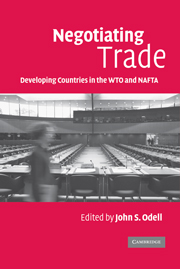Book contents
- Frontmatter
- Contents
- List of figures
- List of tables
- List of contributors
- Acknowledgments
- 1 Introduction
- Part I Multilateral negotiations
- Part II Regional negotiations
- Part III WTO Dispute Settlement Negotiations
- 7 Do WTO rules create a level playing field? Lessons from the experience of Peru and Vietnam
- 8 Compliance bargaining in the WTO: Ecuador and the bananas dispute
- Index
8 - Compliance bargaining in the WTO: Ecuador and the bananas dispute
Published online by Cambridge University Press: 22 September 2009
- Frontmatter
- Contents
- List of figures
- List of tables
- List of contributors
- Acknowledgments
- 1 Introduction
- Part I Multilateral negotiations
- Part II Regional negotiations
- Part III WTO Dispute Settlement Negotiations
- 7 Do WTO rules create a level playing field? Lessons from the experience of Peru and Vietnam
- 8 Compliance bargaining in the WTO: Ecuador and the bananas dispute
- Index
Summary
Introduction
Studies of bargaining in the international economy routinely focus on negotiations regarding the original terms of agreements ex ante rather than on discussions regarding compliance with those commitments ex post. A few scholars have called attention to this often neglected aspect of international negotiations: compliance bargaining. The dynamics of compliance bargaining have particular importance for developing countries, whose post-agreement negotiating power is arguably constrained in many settings. This chapter examines compliance bargaining in the World Trade Organization (WTO) through a case study of Ecuador's tactics in its challenge against the banana import regime of the European Union (EU).
After prevailing in its legal case against the EU banana scheme (as a co-complainant with others), Ecuador pursued an aggressive strategy to encourage compliance with the ruling. In the framework of Odell, Ecuador's stance in this high-profile dispute was a purely distributive strategy. In the universe of international economic negotiations, all compliance bargaining tilts toward the distributive end of the spectrum, as one party claims another has failed to deliver benefits that were previously promised. In the bananas dispute, Ecuador's negotiators creatively sought to maximize their leverage within the specific institutional framework of WTO rules. What is striking about this case is the extent to which those rules – some interpreted and applied for the first time – enabled Ecuador, in effect, to punch above its weight in the multilateral trade system.
As a test of developing country leverage in WTO compliance bargaining, the bananas dispute is a least likely case.
- Type
- Chapter
- Information
- Negotiating TradeDeveloping Countries in the WTO and NAFTA, pp. 257 - 288Publisher: Cambridge University PressPrint publication year: 2006
- 12
- Cited by

